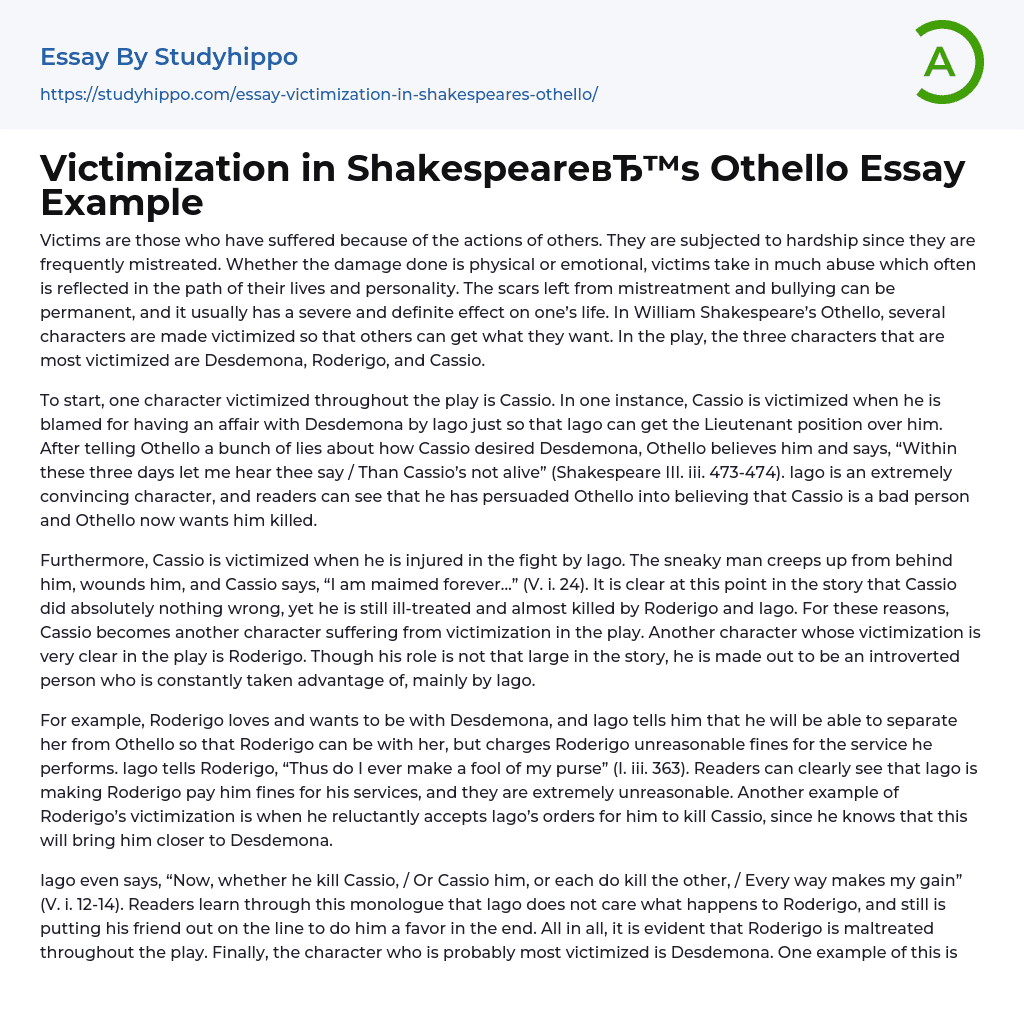Individuals who frequently endure hardships due to other people's actions, being subjected to unjust treatment that results in physical or emotional pain, are generally classified as victims. Their personal growth and life trajectory can be profoundly influenced by continuous abuse. The enduring repercussions of such ill-treatment, especially in situations like bullying, may be irreversible and lead to significant transformations in their lives. This notion is effectively illustrated in William Shakespeare's "Othello", where numerous characters become prey to the ambitions of others. Particularly, Desdemona, Roderigo and Cassio emerge as the principal figures bearing this suffering.
Beginning with, the character Cassio is consistently victimized in the play. There is a particular occurrence when he is wrongfully accused by Iago of having an affair with Desdemona, all so Iago can usurp his Lieutenan
...t position. Iago convincingly tells Othello numerous lies about Cassio's desire for Desdemona. Consequently, Othello believes him and declares, “Within these three days let me hear thee say / Than Cassio’s not alive” (Shakespeare III. iii. 473-474). Iago's persuasiveness is extremely palpable here, as it's clear he has managed to manipulate Othello into thinking Cassio is unworthy and must be eliminated.
Additionally, Cassio becomes a victim when Iago injures him during a confrontation. Iago deceitfully approaches him from behind and inflicts a wound, leading Cassio to exclaim, “I am maimed forever…” (V. i. 24). At this juncture of the narration, it is evident that Cassio is blameless, however, he still suffers from the unjust treatment and near-fatal attack by Roderigo and Iago. Consequently, Cassio represents another character who experiences victimization in the drama. Roderigo is another character in the play whos
exploitation is distinctly noticeable. His role might not be significant in the narrative, but he is portrayed as a quiet individual that is recurrently exploited, specifically by Iago.
As an example, Roderigo harbors a deep affection for Desdemona and yearns to be in her company. Iago assures him that he can facilitate this by sowing discord between Desdemona and Othello. However, Iago demands extreme payments from Roderigo for his help. From Iago's own confession to Roderigo, "Thus do I ever make a fool of my purse" (I. iii. 363), it is evident that Roderigo is being heavily manipulated through steep charges for the services rendered. Another instance of how Roderigo is taken advantage of comes into view when he reluctantly agrees to execute Cassio's murder at Iago's command; believing such a deed would get him closer to Desdemona.
Iago articulates, “Now, whether he kill Cassio, / Or Cassio him, or each do kill the other, / Every way makes my gain” (V. i. 12-14). This monologue reveals Iago's indifference about the fate of Roderigo, and it shows how he manipulates his friend to do his bidding, regardless of the risks. It becomes evident that Roderigo is consistently mistreated throughout the play. Additionally, Desdemona is arguably the most victimized character. There is an instance where Othello unjustly accuses her of infidelity, resulting in him slapping her. In evident confusion about her husband's anger, Desdemona utters, “Why, sweet Othello? / Devil! I have not deserved this” (Shakespeare IV. i. 223-225).
Despite her innocence, Desdemona suffers unjust abuse and subjugation from Othello as a result of the misleading information he receives about her. The unwarranted
accusations lead to an escalation in torment when she is fatally wounded by Othello. As she succumbs to her injuries, acknowledging her blamelessness, she utters with her last breath, "I die a guiltless death" (V. ii. 125). At the moment of her passing, Othello's judgment is obfuscated by confusion; however, once he grasps the full truth, he recognizes his grave mistake and confesses his unfair treatment towards Desdemona. There is no denying the extensive pain that she endures throughout the play.
Shakespeare's Othello clearly depicts a persistent theme of victimization. Desdemona undergoes unjust treatment due to Othello's misguided actions, which are stimulated by Iago's fabricated tales of her supposed unfaithfulness. Similarly, Roderigo is exploited and forced to agree to all of Iago’s demands while compensating him with exorbitant fees for his assistance. Cassio also suffers mistreatment as Iago devises a plan that nearly leads to his demise. The prevalence of victimhood, a distressing element still prevalent in our society today, aligns with sentiments of envy, anguish and vengeance within the drama.
- Abuse Support essays
- Child Abuse essays
- Alcohol Abuse essays
- Physical Abuse essays
- Sexual Abuse essays
- Substance Abuse essays
- Othello Jealousy essays
- Abortion essays
- Abuse essays
- Animal Rights essays
- Animal Testing essays
- Assault essays
- Bullying essays
- Controversial Issue essays
- Crash essays
- Cyber Bullying essays
- Feminism essays
- Human Rights essays
- Immigration essays
- Inequality essays
- Poverty essays
- Prejudice essays
- Racism essays
- Torture essays
- Violence essays
- A Doll's House essays
- A Midsummer Night's Dream essays
- A raisin in the sun essays
- A Streetcar Named Desire essays
- An Inspector Calls essays
- Death of a salesman essays
- Everyman essays
- Fences essays
- Hamlet essays
- Hedda Gabler essays
- Iago essays
- King Lear essays
- Macbeth essays
- Much ado about nothing essays
- Oedipus Rex essays
- Oedipus The King essays
- Othello essays
- Pygmalion essays
- Romeo And Juliet essays
- Tartuffe essays
- The glass menagerie essays
- The Importance of Being Earnest essays
- The Merchant Of Venice essays
- The Taming of The Shrew essays
- Twelfth Night essays




